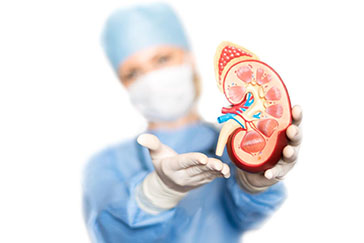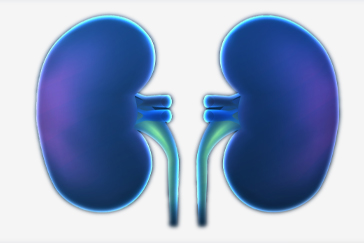 Book Appt.
Book Appt.
 Call Now
Call Now


In a deceased-donor kidney transplant, a kidney from someone who has just died is donated to someone in need of one. The kidney is extracted from the recently deceased person with the family's approval or using a donor card. The kidney recipient's kidneys have failed and are no longer working correctly. The donated kidney is either placed on ice or connected to a machine. The gadget delivers oxygen and nourishment until the kidney is transplanted into the individual who requires them. The donor and beneficiary are frequently in the same geographic area. This allows the transplant clinic to shorten the time the kidney is outside the human body.
Why it is done
People with end-stage renal disease have kidneys that are no longer functional. People with end-stage renal disease require waste removal from their bloodstream to keep alive. Dialysis is a machine-based method for removing waste. Another option is to have a kidney transplant. Most persons with advanced renal disease or kidney failure choose a kidney transplant. A kidney transplant provides a decreased chance of death, a higher quality of life, and more nutritional options than dialysis.
Risks
The risks of a deceased-donor kidney transplant are similar to those of a living-donor kidney transplant. Some are comparable to the hazards associated with any surgical procedure. Others are concerned with organ rejection and the negative effects of anti-rejection medicines. Risks include pain, incision site infection, bleeding, blood clots, organ rejection, and anti-rejection medicine side effects.
How you prepare
If your doctor advises a kidney transplant, you will be directed to a transplant clinic. You have the option of selecting a transplant center on your own or from your insurance company's preferred provider list. After selecting a transplant center, you will be screened to see whether you meet the center's eligibility requirements. The examination can take a few days and includes:
After the testing, the transplant team will determine whether you are a candidate for transplant. If a compatible living donor is not available, your name will be added to a waiting list to receive a kidney from a deceased donor. Everyone on the national waiting list for a deceased-donor organ has been registered. The waiting list is a computer system that stores information about people who are waiting for a kidney. When a deceased-donor kidney becomes available, the information is uploaded into the computer system to find a match. The computer generates a prospective match based on a variety of parameters. These include the person's blood type, tissue type, length of time on the waiting list, and distance between the donor and transplant hospitals.
What you can expect
The transplant facility may find a deceased-donor kidney that is a good match for you at any time of day or night. You will be notified immediately and requested to come to the transplant center within a particular time frame. You must be prepared to go to the facility immediately and get evaluated. The transplant team will ensure that the kidney is in satisfactory condition for transplant. They will also ensure that you are in overall good health and that the kidney is a good fit for you. If everything seems fine, you'll be ready for surgery.
During surgery, the donor kidney is inserted into your lower abdomen. Blood vessels from the new kidney connect to blood vessels in the lower abdomen, slightly above one of your legs. The surgeon will also attach the tube from the replacement kidney to your bladder to allow urine flow. This tube is known as the ureter. The surgeon normally keeps your kidneys in situ.
Results
Following a successful kidney transplant, your new kidney will filter your blood and eliminate waste. You will no longer require dialysis. You will take medications to keep your body from rejecting your donated kidney. These anti-rejection medications inhibit the immune system. This increases the likelihood that your body may become infected. As a result, your doctor may give antibiotics, antivirals, and antifungal medications.
You must take all of your medications exactly as your doctor prescribed. If you skip your medications, your body may reject your new kidney. If you experience any side effects that prevent you from taking the medications, please contact your transplant team immediately. Following the transplant, undertake skin self-checks and consult with a dermatologist to screen for skin cancer. It is also strongly recommended that you keep up with other cancer tests.
Conclusion
A deceased-donor kidney transplant is a life-saving option for patients with end-stage renal illness. While the procedure requires extensive examinations, surgical competence, and post-operative care, it considerably improves the recipient's quality of life and long-term survival when compared to dialysis. Successful outcomes are contingent upon timely organ allocation, careful surgery, and lifelong commitment to immunosuppressive therapy and follow-up care. Awareness and support for organ donation are still critical in addressing the donor kidney shortage and reducing wait times.
SHALBY Sanar International Hospitals provides extensive medical procedures backed up with our state-of-the-art technology and a team of highly qualified & experienced clinical experts.

Patient from Indonesia gets Kidney Transplant | SHALBY Sanar Interntional Hospitals

Patient from Indonesia gets Kidney Transplant | SHALBY Sanar Interntional Hospitals

Successful Kidney Transplant of a patient by Dr Amit Kumar

Successful Live Renal Allograft Transplant: Mr. Zaid's Journey to Recovery by Dr Amit Kumar Yadav

Life Renewed: Mr. Evans Elieza Aveva's Remarkable Kidney Transplant Journey

A successful Kidney Transplant gives Mr. Tache from Ethiopia, a new beginning

Successful story of kidney transplant I #kidneytransplant #patient testimonial
Our doctors pen down their research findings and experiences from time to time. Their words provide deep insight into the latest techniques, technologies and other advancements in healthcare. It provides expert answers to all kinds of health questions for real-life issues.
VIEW ALL




Since the day of its foundation, SHALBY Sanar International Hospitals is committed to provide comprehensive healthcare services. It regularly organizes awareness programs in its premises and encourages outdoor healthcare activities and camps with an intent to put focus on preventive healthcare.
VIEW ALL